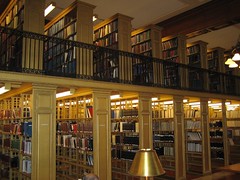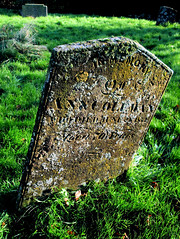 © 2009 JupiterImages © 2009 JupiterImages |
Oral History
Oral history is a way to capture your family member’s history in their own words and preserve it for both yourself and others in your family. In February 2009, Dr. Louis J. Marchiafava, a prominent oral historian and former archivist for the Houston Metropolitan Research Center and Houston Public Library, presented an Oral History workshop. Below are some of the tips he mentioned:
- Plan and prepare for the interview ahead of time
- Test your tools (recorder, tapes, microphone, etc.) & take extras with you
- Start a framework or theme that reflects the role of that person within the family
- Look for diaries, photos, letters or awards as potential talking points
- Ask to view bibles for records on family births, deaths, and marriages.
- Ask open-ended questions
- Transcribe and make copies of recording
Additional Tips and Guides
Oral History Association, OHA Wiki and Cyndi’s List: Oral History & Interviews have information on reliable recording devices, as well as other resources and tips.
Jelly Jar & About.com have compiled lists of questions to ask when interviewing family members.
Examples of State and Local Oral History Projects
- Houston Oral History Project by University of Houston’s Center for Public History
- JSC Oral History Project created by NASA
- Tejano Voices, the University of Texas at Arlington Center for Mexican American Studies Oral History Project
Locate a library that may contain information pertinent to your family line. Ask about newspaper on microfilm, old maps, or special collections. Clayton Library Center for Genealogical Research, founded in 1921, has been named one of the top nine genealogical libraries in the nation to visit by Family Tree magazine (July 2008). Check out Clayton Library’s FAQ section to help answer many questions you may have.
Cemetery & Church Records
Do you know the best time to visit a cemetery or the proper etiquette? Tiptoeing Through the Graveyard answers these and lots more questions in regards to conducting genealogy research in cemeteries and churches. If permitted, taking pictures of grave markers is a quick and accurate way to document the information.
Additional Tips & Pitfalls
These online resources offer a wealth of great tips:
- Houston Genealogical Forum has tips for searching local directories.
- Adoption Research provides information for adopted persons interested in searching their family history
- Family Search Research Help allows you sort the information by place, title, subject or document type.
Exercises:
1. Look at some of the examples provided of oral history projects and listen to some of the stories, Tejano Voices in particular has some good examples.
Have you ever pursued an oral history project? Would you consider doing one to record your family history? Who in your family would be a good subject?
2. Go to Find-A-Grave site and search for a cemetery location. Pick one cemetery and locate the oldest burial listed, then post the information that is provided about the person onto your blog.
This module brought to you by Jorie Nissen (FM), Laura Smith (FM) & Rhiannon Perry (LAP).






4 comments:
After doing some family research, I have found that even oral history can be wrong! But they do give you a direction to do your research.
Oral history is never really wrong. It is how the past was viewed by your subject. Everyone doesn't have the same viewpoint.
What I was referring to concerning oral history was wrong was the birthplace of my grandfather. Family said he was born in one place and written document stated something else.
I went to a cemetery over the weekend and the oldest burial date I could find was the 1850's. This was a cemetery were many German immigrants were buried. Many of them did not immigrate to Texas until 1840's- 1880's.
The grave I found was John W. Lumpkin, b. 1-13-1814, d. 12-29-1854
I found the oral history ver interesting. Although my father and mother's sides of the family were of German ancestry, I did find some info on the town Wiemar, TX and who the people were and how they lived. Very helpful for the family tree.
Post a Comment